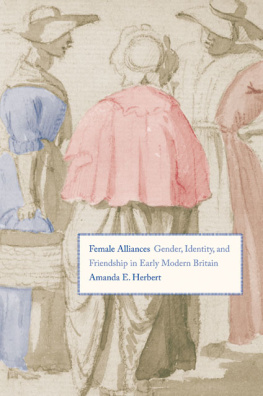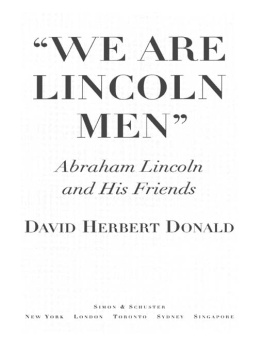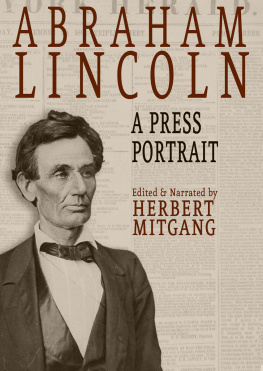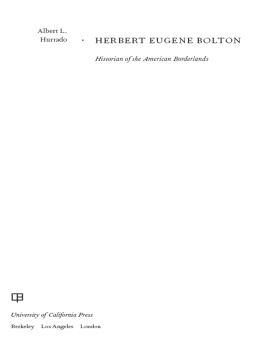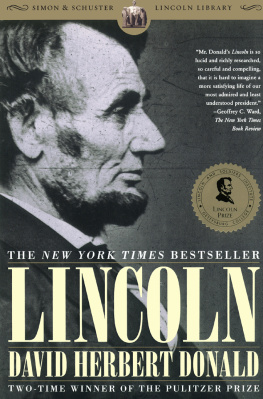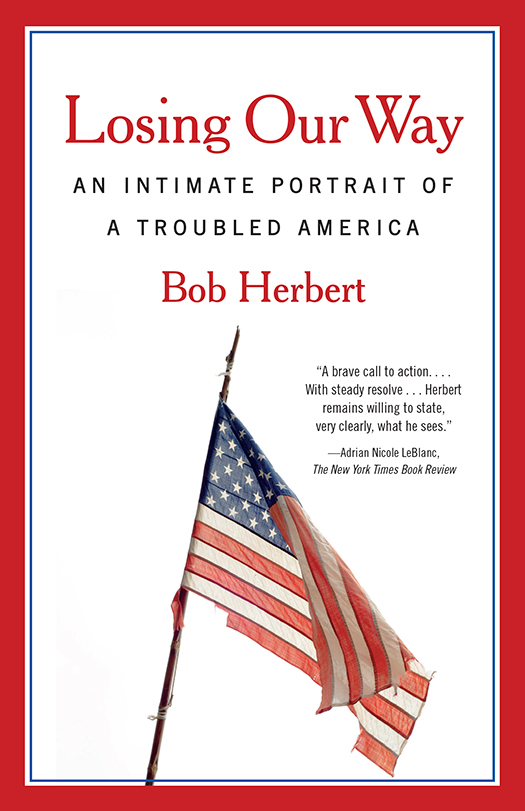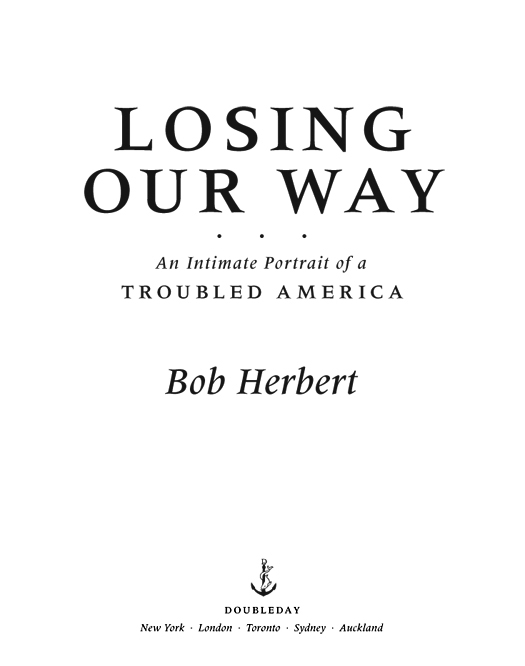Copyright 2014 by Bob Herbert
All rights reserved. Published in the United States by Doubleday, a division of Random House LLC, New York, and in Canada by Random House of Canada Limited, Toronto, Penguin Random House companies.
www.doubleday.com
Doubleday and the portrayal of an anchor with a dolphin are registered trademarks of Random House LLC.
Cover design by John Fontana
Cover photograph Paul Abbitt / Millennium Images, UK
Library of Congress Cataloging-in-Publication Data
Herbert, Bob, 1945
Losing our way : an intimate portrait of a troubled America / Bob Herbert.First edition.
pages cm
ISBN 978-0-385-52823-8 (hardback) ISBN 978-0-385-53589-2 (eBook)
1. United StatesSocial conditions21st century.
2. United StatesEconomic conditions21st century.
3. Middle classUnited States. 4. United States
Politics and government1989 I. Title.
HN59.2.H467 2014
305.550973dc23 2014022729
v3.1_r2
ALSO BY BOB HERBERT
Promises Betrayed: Waking Up from the American Dream
For my wife, Deborah
And to the memory of my parents,
Adelaide and Chester
CONTENTS
AUTHORS NOTE
The moment came unexpectedly, which is how denial is often pierced. Guntars Lakis, an architect in Bridgeport, Connecticut, had been watching his small kids at soccer practice. They came running toward him when practice was over, sweating, giggling, and clamoring for Italian ices. That was when he realized how far he had fallen. In a lush, beautifully landscaped suburban park, on a late afternoon in summer, he felt ashamed. They wanted an Italian ice after practice, he told me, and I didnt have four dollars in my wallet to buy it for them. I didnt have any money at all.
The twenty-first century has not been kind to the middle class in America. The economic nightmare that descended on the Lakis family was part of an epic change in the lives of individuals and families across the country. Millions of hardworking men and women who had believed they were solidly anchored economically found themselves cast into a financial abyss, struggling with joblessness, home foreclosures, and personal bankruptcy. Some were astonished to find themselves turning to food banks and homeless shelters. The hard times would eventually spread like a blight across the country, wiping out savings, crushing home values, and upending carefully nurtured career plans. For much of the population, the very notion of economic security evaporated.
Spirits sank along with bank balances. The Great Recession and its dismal aftermath showed unmistakably that a great change had come over the country. The years that had been unkind to the middle class were positively brutal to the working class and the poor. The United States was no longer a place of widely shared prosperity and limitless optimism. It was a country that had lost its way. By 2012 the net worth of American families had fallen back to the levels of the early 1990s. Poverty was expanding, and the middle class had entered a protracted period of decline. Signs of distress were everywhere. There were not nearly enough jobs for all who wanted and needed to work. Middle-aged professionals were being forced into early, unwanted retirement. Low-wage, contingent workwithout benefits and with no retirement securitywas increasingly becoming the norm. Even young graduates with impressive credentials from world-class colleges and universities were finding it difficult to put together a decent standard of living. For millions of Americans, there was no work at all.
As I traveled the country doing research for this book, I couldnt help but notice that something fundamental in the very character of the United States had shifted. There was a sense of powerlessness and resignation among ordinary people that I hadnt been used to seeing. The country seemed demoralized. I remembered the United States as a far more confident and boisterous place in the days when I was growing up in suburban New Jersey in the 1950s and 60s. Kids, grown-ups, everybody had their dreams and were unabashedly flexing their muscles, ready to make them come true. The bigger the dream, the better. Each day was the dawn of new possibilities. All you needed was energy and a willingness to work hard.
That bold confidence in the future now seemed as old-fashioned as typewriters and telephone booths. There was still plenty to admire about the United States, and crowds could be heard from time to time chanting U.S.A.! U.S.A.! at rallies and ball games. But what I was seeing in my travels was a deeply wounded society, with a majority of respondents in poll after poll saying the U.S. was in a state of decline. The symptoms were numerous, varied, and scary. The economy seemed to work only for the very wealthy. By 2013 the richest 1 percent in America was hauling in nearly a quarter of the nations entire annual income and owned 40 percent of its wealth. The bottom 80 percent of Americans, 250 million people, were struggling to hold on to just 7 percent of the nations wealth. No wonder people were demoralized.
The high rollers continued to thrive despite the recession and its widespread suffering. The head of Goldman Sachs, Lloyd Blankfein, was compensated to the tune of $13.2 million in 2010 as salaries and bonuses on Wall Street roared back from the economic debacle set in motion by the recklessness of those very same Wall Street bankers and their acolytes in government. By 2013 the stock markets were setting record highs, and banks that were once thought too big to fail were growing bigger still.
The incomes of the ber-rich came to mind one winter morning as I was reading a desperate letter written by a woman in her mid-fifties to Senator Bernie Sanders of Vermont. The woman and her husband were unemployed and about to lose their home to foreclosure. I pray to God, she wrote, that we do not have to resort to living in the car which is unimaginable in the middle of January in zero degree temperatures with no gas money to run the engine to keep warm.
For ordinary Americans, the story of the past several years has too often been about job cuts, falling wages, vanishing pensions, and diminished expectations. Birthrates plummeted in the wake of the recession as couples put off having children for financial reasons. The lowest birthrates ever recorded in the U.S. were in 2011 and 2012. By then, nearly one in every four American children was poor. For black children, it was one in three. The decline in births came as studies were showing alarming increases in mortality rates for some segments of the population. From 1990 to 2008 the life expectancy for the poorest, least well-educated white Americans fell by a stunning four years. For white women without a high school diploma, it fell by five years.
One night, after Id moderated a program on Afghanistan at the Kennedy Presidential Library in Boston, a World War II veteran came up to me and asked plaintively, What happened to us? His tone and weathered face conveyed a sense of real loss. Hed known a different America, having worked as an engineer and raised a family in the Midwest in the postWorld War II period when the United States showed every sign that it was really getting its act together, becoming in actual fact a more perfect union. As we talked, I thought back to that era, which in many ways was a golden time. By the mid-1960s the warm glow of success was spreading like the summer sun to most of the country. The first of the baby boomers had put aside their Davy Crockett hats and





